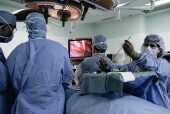 |
 |
 |

Pediatric Heart Surgeons May Be Best Choice for Adults
Study finds these doctors have better results, including survival rates|
|
HealthDay
By Robert Preidt
Friday, November 7, 2008
 FRIDAY, Nov. 7 (HealthDay News) -- Pediatric heart surgeons may be the best choice for adults requiring surgery to repair a congenital heart defect, a new study suggests.
FRIDAY, Nov. 7 (HealthDay News) -- Pediatric heart surgeons may be the best choice for adults requiring surgery to repair a congenital heart defect, a new study suggests.
A congenital heart defect occurs when there's abnormal pre-birth development of the heart or blood vessels near the heart.
The researchers analyzed a national database to identify 30,250 congenital heart defect surgeries performed from 1988 to 2003. They compared results of cases performed by pediatric heart surgeons -- surgeons who do 75 percent of their procedures on patients younger than 18 years -- to results of heart surgeons who didn't specialize in pediatric cases.
Among the almost 8,200 adult patients in the study, the risk of in-hospital death for those operated on by congenital heart surgeons was 1.87 percent, compared to 4.84 percent for patients operated on by general heart surgeons.
"We found that this survival advantage increased with increasing annual pediatric surgery volume," study lead author Dr. Tara Karamlou, a cardiothoracic surgery fellow at the University of Michigan in Ann Arbor, said in an American Heart Association news release. "We also found that patients had shorter hospital stays and lower hospital charges when they used surgeons who performed a greater percentage of pediatric heart cases."
The researchers also identified important differences in surgeries conducted by pediatric and non-pediatric heart surgeons.
"Whereas specialized pediatric heart surgeons performed 68 percent of the pediatric operations, more than 95 percent of adult congenital heart disease patients received their care from non-congenital heart surgeons," Karamlou said.
"There is a striking separation that occurs: Patients with adult congenital heart disease undergo repair by surgeons whose primary focus is adult cardiac surgery, but pediatric patients within the same diagnostic subgroups undergo repair by surgeons whose primary focus is congenital heart surgery. The separation, therefore, appears primarily motivated by an arbitrary designation of 'adulthood' rather than a fundamental difference in the underlying disease process," Karamlou said.
The findings, published online Nov. 7 in the journal Circulation, show the need for initiatives to develop medical centers that include congenital heart surgeons for managing adult congenital heart disease, according to Karamlou.
"We did this study to define national practice patterns for adult congenital heart disease patients and to determine whether these patients experience improved outcomes when treated by specialized pediatric heart surgeons. This information is important, given the rapidly increasing numbers of adult patients with congenital heart disease," she said.
In 2002, 650,000 to 1.3 million people in the United States had congenital cardiovascular defects, according to the American Heart Association. Overall, congenital cardiovascular defects affect about the same number of people younger and older than age 25, but the proportions differ according to the type of defect. In 2004, U.S. hospital costs for congenital cardiovascular defects were $2.6 billion, the researchers said.
HealthDay
Copyright (c) 2008 ScoutNews, LLC. All rights reserved.
Related News:
More News on this Date
Related MedlinePlus Pages:
| Home | Health Topics | Drugs & Supplements | Encyclopedia | Dictionary | News | Directories | Other Resources | |
| Disclaimers | Copyright | Privacy | Accessibility | Quality Guidelines U.S. National Library of Medicine, 8600 Rockville Pike, Bethesda, MD 20894 National Institutes of Health | Department of Health & Human Services |
Date last updated: 10 November 2008 |




